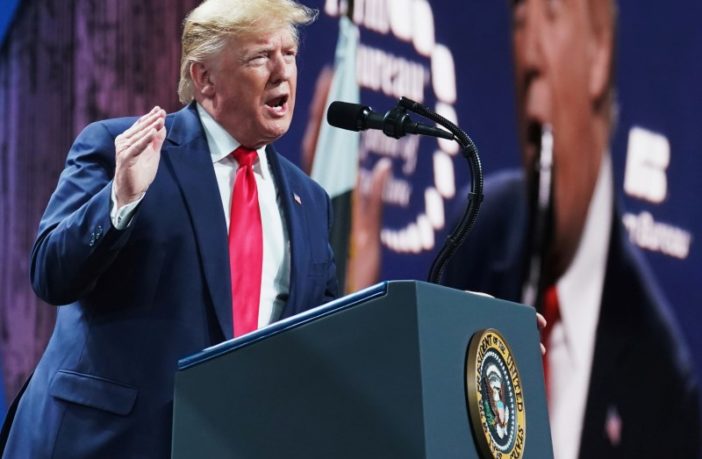An Iranian lawmaker offered a $3 million (2.3 million pounds) reward to anyone who killed U.S. President Donald Trump and said Iran could avoid threats if it had nuclear arms, ISNA news agency reported on Tuesday amid Tehran’s latest standoff with Washington.
U.S. disarmament ambassador Robert Wood dismissed the reward as “ridiculous”, telling reporters in Geneva it showed the “terrorist underpinnings” of Iran’s establishment. [nL8N29Q42Z]
Tensions have steadily escalated since Trump pulled Washington out of Tehran’s nuclear agreement with world powers in 2018 and reimposed U.S. sanctions. The standoff erupted into tit-for-tat military strikes this month.
“On behalf of the people of Kerman province, we will pay a $3 million reward in cash to whoever kills Trump,” lawmaker Ahmad Hamzeh told the 290-seat parliament, ISNA reported.
He did not say if the reward had any official backing from Iran’s clerical rulers.
The city of Kerman, in the province south of the capital, is the hometown of Qassem Soleimani, a prominent Iranian commander whose killing in a drone strike ordered by Trump on Jan. 3 in Baghdad prompted Iran to fire missiles at U.S. targets in Iraq.
“If we had nuclear weapons today, we would be protected from threats … We should put the production of long-range missiles capable of carrying unconventional warheads on our agenda. This is our natural right,” he was quoted as saying by ISNA.
The United States and it Western allies have long accused Iran of seeking nuclear weapons. Tehran insists it has never sought nuclear arms and never will, saying its nuclear work is for research and to master the process to generate electricity.
The 2015 nuclear agreement overall was designed to increase the time Iran would need to obtain enough fissile material for a nuclear bomb. Parties to the deal believed, at the time, Iran could produce enough material in two to three months if it wanted.
Under the deal, known as the JCPOA, Iran received sanctions relief in return for curbing its nuclear activities. In response to Washington’s withdrawal from the pact and pressure from U.S. sanctions, Iran has rolled back its commitments to the deal.
This month, Iran announced it was scrapping all limits on its uranium enrichment work, potentially shortening the so-called “breakout time” needed to build a nuclear weapon.
Reports issued by the U.N. nuclear watchdog have suggested Tehran is still far from sprinting ahead with its work.
After Iran’s latest step, Britain, France and Germany triggered a dispute mechanism in the nuclear pact, starting a diplomatic process that could lead to reimposing U.N. sanctions.
Iran said on Monday that Tehran would pull out from the Non-Proliferation Treaty (NPT) if international sanctions were reimposed.
The U.S. envoy Wood said Iran’s threat to quit the treaty, the foundation of global nuclear arms control since the Cold War, would send a “very, very negative message”.




